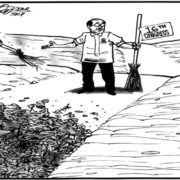At the 22nd World Economic Forum (WEF) on East Asia, President Benigno S. Aquino III told businessmen that the Philippines, as the “brightest spark” in Southeast Asia and as “Asia’s Rising Tiger,” is now ripe for investments, touting “the reforms and the new mandate his administration received from the Filipino people in the last midterm elections,” reported Philstar.com.
“Today, all the factors are in place: political stability, low inflation and low borrowing rates, opportunities for growth in almost all sectors, a government committed to integrity and empowerment, and a people known the world over for their industry, loyalty, and creativity,” Aquino said during a luncheon hosted by Ayala Corp., which is owned by the Zobel de Ayalas, longtime members of the WEF.
“In our country, you have the recipe for sustained, inclusive growth that benefits investors and the public alike. All that is left is for us to engage each other, and work together – and this is precisely why we are here today,” Pres. Aquino further said.
Fortifying his claim to businessmen, Aquino emphasized the country’s 7.8 percent gross domestic product growth in Q1 of 2013, an investment grade from Fitch Ratings and Standard and Poor’s, Team PNoy’s victory in the recent midterm elections and reforms made in various aspects to increase the Philippines’ credibility and make it more attractive for business.
“This is the perfect time to invest in the Philippines. More and more opportunities have been created… both as a result of and as an affirmation of our commitment to reform, and we are here today to share these opportunities and invite you to work with us,” Aquino said.
The president also said that infrastructure development plays a pivotal role in stimulating growth of all other sectors.
“Right now, the Philippines is behind its ASEAN (Association of Southeast Asian Nations) counterparts in this regard, including the state of our roads. Instead of seeing this as a setback, we choose to see it as an opportunity to make quality investments into infrastructure. So, we have increased our budget for infrastructure, from $4.86 billion in 2012 to $5.94 billion in 2013. This more than $1-billion increase will go toward paving all unpaved sections of our national road network, and developing airports and other transport hubs in the country,” he explained.
“At the same time, we also know that harnessing the expertise of the private sector will help us accelerate infrastructure development, which is why we are fostering greater engagement and partnership between the public and private spheres. We have already rolled out a number of projects; some are under construction, while others are still open for participation – from the construction of classrooms, and the rehabilitation, operation, and management of hydroelectric power plants, to the construction of highways,” Aquino added.
The president pointed to agriculture and tourism as two other sectors being prioritized by his administration, “not only because they make the most of our country’s strengths, but also because they create jobs, complement existing livelihoods, and ignite rural development.”
Lack of infrastructure and support to farmers stunted the agricultural sector, but Aquino’s administration “went back to basics, improving irrigation systems and constructing and rehabilitating farm-to-market roads,” reported Philstar.com.
Meanwhile, the country’s tourism is booming, attracting both tourists and foreign investors.
“The Philippines is in high demand, with 4.3 million tourists in 2012 discovering that, indeed, it’s more fun in the Philippines. With publications like Conde Nast Traveller, the New York Times, and Travel and Leisure Magazine trumpeting our beaches, nightlife, and diving – not to mention the Filipino hospitality that has made our people so famous – we are confident that we will meet, and hopefully even surpass, our 2016 target of 10 million tourist arrivals,” he said.
The president also emphasized on the importance of key legislation (responsible parenthood and sin taxes) that were enacted, as well as the Bangsamoro agreement signed by his government and the Moro Islamic Liberation Front, bringing enduring peace to Mindanao.
For Pres. Aquino, Team PNoy’s recent victory in Senate and Congress during the midterm elections also serves as “an affirmation of the mandate that [Aquino] won in 2010 and a vote for continuity.”
“If the public continues to share my vision for the country, as they have done in the past years, then anyone who aspires to succeed me would do well to continue down the path we have taken – and continue the tradition of good governance and public service, as well as the reform agenda that has brought the country so much success,” the President said.
Procurement and budgeting processes were also reformed, where funding from ineffective programs were allocated instead towards more beneficial endeavors for the citizens: social services, health, education and infrastructure development.
“I have heard our country called a hotspot, Asia’s Rising Tiger, or the brightest spark in Southeast Asia, just to name a few. These accolades are not unwarranted. For the first time in history, the Philippines is rated investment grade by two major credit rating agencies. These agencies have cited our robust growth as well as the low and stable inflation rate in the country – all while many other economies are experiencing slowdowns. In fact, the Philippine economy has consistently surpassed all expectations so far: full-year growth for 2012 was at 6.8 percent – higher than our growth assumption of 6 percent – while in the first quarter of 2013, our economy expanded by 7.8 percent,” Aquino further explained.
There is no better person to do the task of pitching the country to prospective investors, than our very own chief executive. Hopefully, all that we have achieved in the past years and the economic growth that we’ve been gaining consistently, would speak for themselves.
(AJPress)







